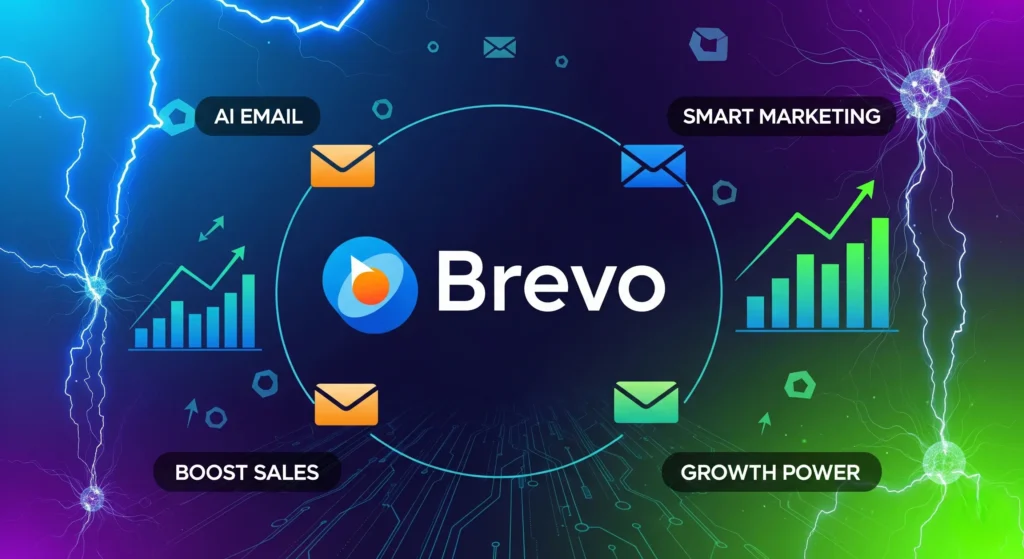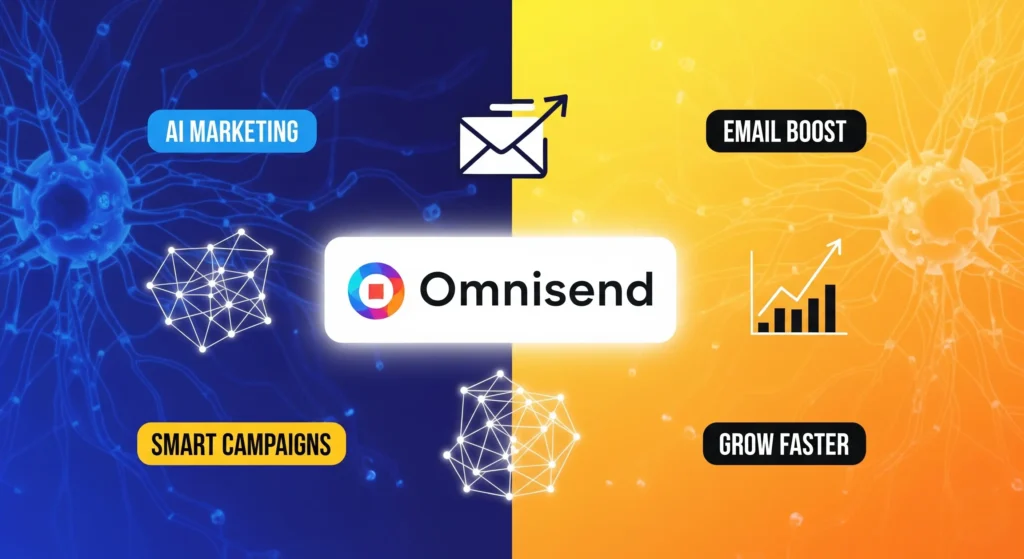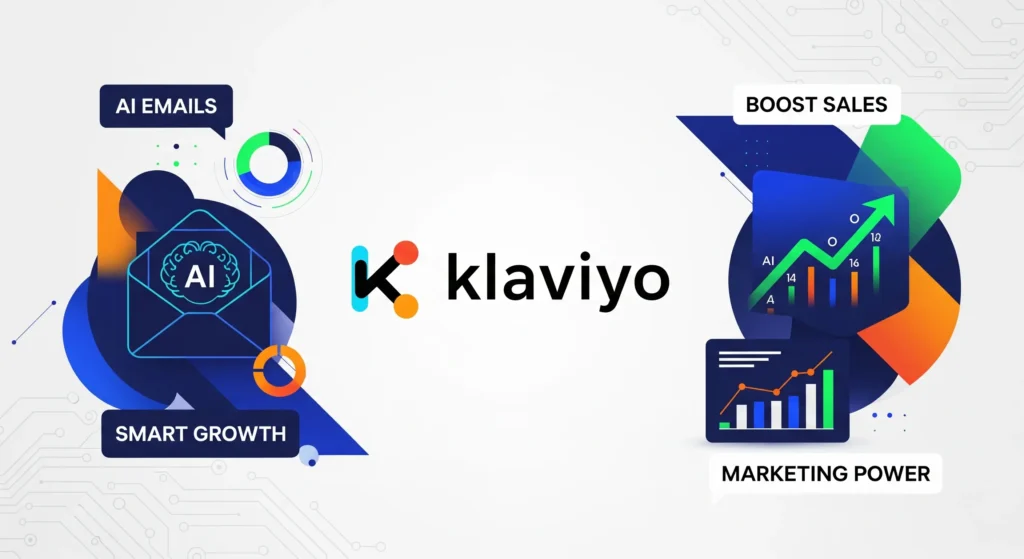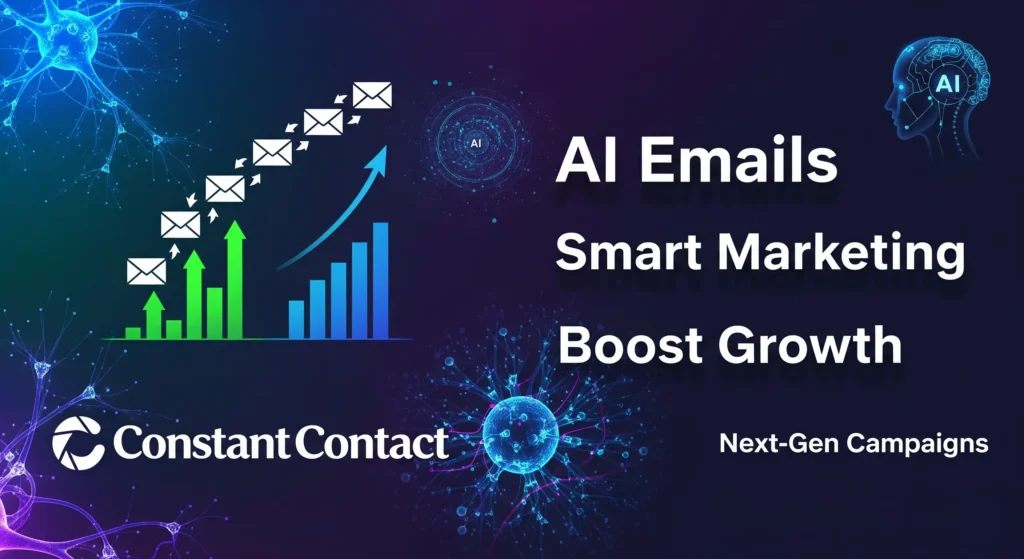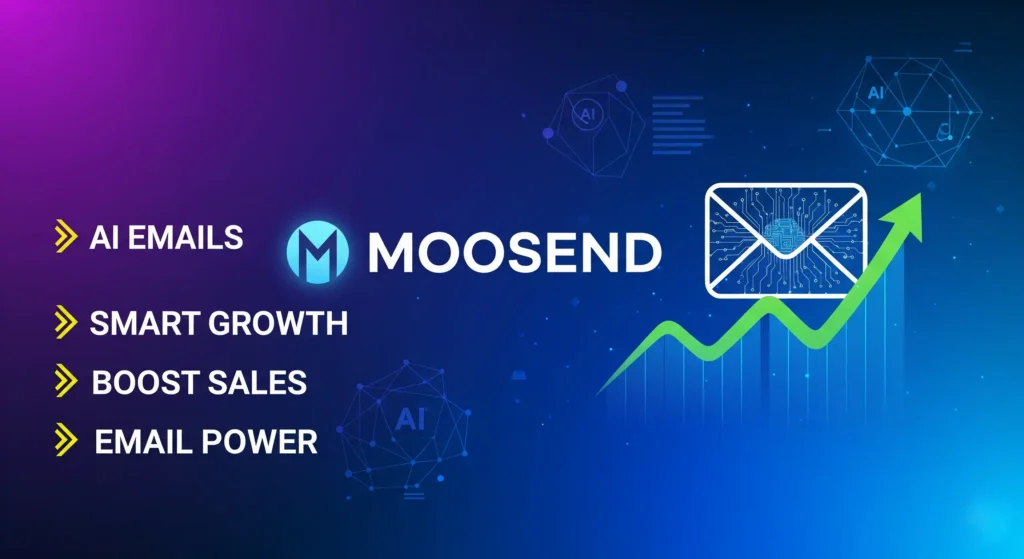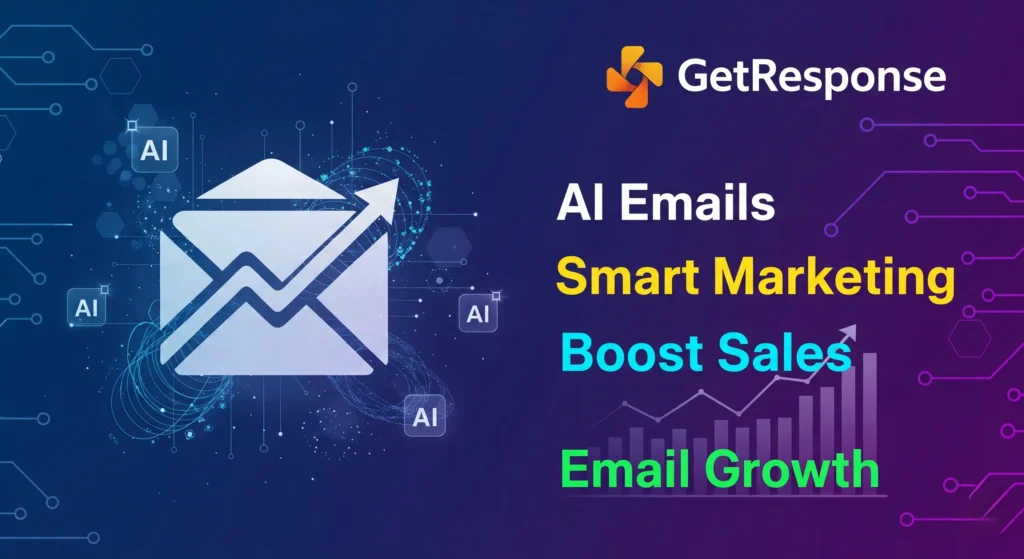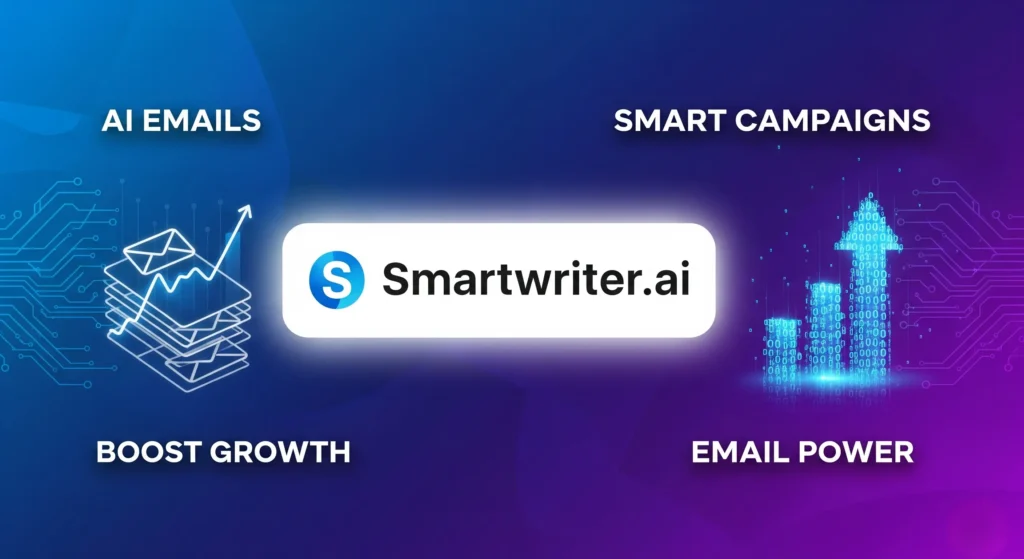A big part of digital strategy for a long time has been email marketing. But in 2025, it’s not just about mass emails and static themes. Artificial intelligence is what makes the future possible. AI tools for email marketing are no longer just for big brands; they’re necessary for any business, no matter how big or small, that wants to stay competitive. These tools use machine learning to automate hard chores, personalise on a large scale, and give insights that used to be the sole domain of data scientists.
This piece tells you everything you need to know about AI tools for email marketing. We’ll talk about how these platforms are changing the way we talk to customers and why they’re so important for success in the current market. We’ll also go over in detail the top 10 AI email marketing software platforms you need to know about in 2025.
Why AI Tools for Email Marketing Are a Game-Changer
The switch to email marketing driven by AI isn’t just about saving time; it’s also about being smart and getting things done. The perks are huge and have a direct effect on your bottom line.
- Hyper-Personalization at Scale:
- In the past, personalization only meant putting your first name in the topic line. This is on a whole new level with AI. It looks at a lot of information about the customer, like what they’ve looked at and bought in the past, as well as demographic data and engagement habits, to make dynamic, personalised content for each recipient.
- AI can then suggest goods, offer discounts that are specific to them, and even change the layout of emails in real time, making each one feel like it was made just for the recipient. A lot more people are interested and buy from you when you personalise things this much.
- Smart Automation and Workflow Optimisation:
- Marketing teams don’t have time to do the same things over and over again. AI takes care of these jobs automatically, so marketers can focus on strategy and creativity.
- Based on how a user acts, AI-driven automation can start welcome series, notes for abandoned carts, and re-engagement campaigns.
- It uses more than just “if-then” thinking to figure out what the best next step is, making sure the right message is sent at the right time.
- Data-driven insights and predictive analytics:
- Gone are the days when you had to do A/B tests and guess by hand. AI gives us real-time information that we can use.
- It can look at how well each campaign did, guess which groups are most likely to convert or resign, and even guess how well a campaign will do before it’s sent. Because you can see what will happen, you can be proactive instead of reactive, which helps you make smarter choices that lead to growth.
- Higher Open Rates and Better Deliverability:
- Getting your email into the inbox is one of the hardest parts of email marketing. AI helps with this in two main ways:
- Optimal Send Time: AI algorithms look at how each user acts to figure out the exact time when they are most likely to open an email. This gets rid of the need to send emails in groups, and it greatly raises the number of emails that are opened.
- Content and Subject Line Optimisation: AI can look at the content and subject lines of your emails and tell you how to make them more appealing and stay out of spam filters. This makes sure that your emails get to the right people and are interesting enough to be read.
- A better return on investment (ROI) is the result of all of these benefits:
- Personalisation, automation, and data insights. You can get more sales, keep customers from leaving, and grow your business more efficiently by sending emails that are more relevant, timely, and interesting.
Top 10 AI Tools For Email Marketing
It is very important to choose the right site. Here are the top 10 AI tools for marketing that will change the world in 2025.
1. Mailchimp AI
Brief Introduction:
Mailchimp has been a leader in email marketing for a long time, and it has aggressively added AI to its platform, making it a strong choice for businesses of all kinds. Its AI features are driven by Intuit Assist, which gives you a set of easy-to-use tools to make campaigns run more smoothly.
Key Features:
- Generative AI: The AI can quickly make up new email subject lines, body copy, and even whole email designs based on simple instructions.
- Predictive Segmentation: AI looks at data about customers to make smart, focused groups. This makes it easier to send messages that are relevant.
- Content Optimizer and Creative Assistant: These tools that use data to help you make your content better by giving you ideas in real time and making visuals that are on-brand.
- Send Time Optimization: AI figures out the best time to send emails to each receiver so that the most people open them.
Best For:
- Small to medium-sized businesses, online shops,
- Solopreneurs who need a platform that is easy to use and has a lot of features should use this one.
- It’s a great place to start for people who are new to AI email marketing.
✅ Pros
- The design is very easy to use.
- A lot of AI tools that are simple to use.
- A large community and a well-known name.
- A nice, free plan.
❌ Cons
- If your list gets bigger, your prices may go up.
- The AI parts aren’t separate, highly complicated tools, they’re more built into the main product.
2. HubSpot’s marketing Hub AI.
Brief Intrduction:
It’s true that HubSpot is an all-in-one marketing platform, and its AI features are built right into its CRM and marketing tools. In 2025, its Marketing Studio and AI Email engine are setting new standards for how fast and personalised emails can be.
Key Features
- AI Email Engine: Writes whole branded emails from prompts and makes sure that each receiver gets a unique version of the content based on their CRM information.
- Smart Segmentation: AI turns static lists into “living audiences” that change in real time based on contact and behaviour, which makes targeting very specific.
- AI Strategist: An AI built into the Marketing Studio helps plan campaigns by offering the best timing, messaging, and mix of channels.
- Predictive Lead Scoring: AI looks at how a prospect acts to give leads a score. This helps the sales and marketing teams focus on the most important contacts.
Best For:
- Medium-sized to large businesses, B2B firms, and marketing firms that need a CRM, sales, and marketing system that works together.
- This is for businesses that want a single tool to handle the whole customer journey.
✅ Pros
- It works perfectly with a full CRM.
- The AI has strong features for advanced classification and personalization.
- Great for making marketing and sales efforts bigger and more coordinated.
❌ Cons
- It might cost a lot, especially for small companies.
- It takes longer to learn how to use the platform than easy email builders.
3. ActiveCampaign
Brief Introduction:
ActiveCampaign has been a star in marketing automation for a long time, and the addition of AI has made its platform even better. It’s known for having powerful automation processes that can be changed in a lot of ways.
Key features:
- Predictive Sending: AI looks at past behaviour to figure out when the best time is to send an email to each contact, which increases the number of opens.
- AI-based Lead Scoring: This scores leads automatically based on how engaged they are and how they act, which helps you decide which leads to follow up with first.
- Smart Content Suggestions: AI can tell each user about items or content that would be good for them based on their actions and profile.
- Automation Map: AI helps people see and improve complicated automation processes that involve many touches.
Best For:
- E-commerce companies and marketers who need advanced automation based on behaviour and deep classification should use this.
- It is very flexible, which makes it a great choice for funnels and customer paths that are complicated.
✅ Pros
- Automation features that are the best in the business.
- Strong connections to more than 900 other apps.
- Excellent rates of delivery.
❌ Cons
- For new users, the sheer number of functions can be too much to handle.
- The interface may not feel as up-to-date as those of rivals like Mailchimp.
4. Brevo (formerly Sendinblue)
Brief Introduction:
Brevo has made a name for itself as a flexible and affordable marketing tool. It recently put €50 million into AI research, which led to the creation of Aura, a powerful AI agent that can be accessed directly from the platform’s website.
Key Features:
- Aura AI Marketing Agent: It is an AI helper that works like a chatbot and can write good subject lines, emails, and change the tone.
- Contact Data Enrichment: Aura can automatically add more contact information, like job names, to make profiles that are more complete and allow for smarter Segmentation.
- Predictive Send-Time Optimization: The AI can figure out when a person is most likely to be online and send emails at that time.
- Workflow Automation: Gives you a strong visual builder to make automatic paths.
Best For:
- Small to medium-sized teams that want an all-in-one platform but don’t want to pay the high price of an enterprise-level platform.
- People who want a single tool for chat, email, and SMS will love this
✅ Pros
- It’s very cheap and comes with a very large free plan.
- Aura is a one-of-a-kind and powerful AI programme.
- Provides a full set of digital marketing tools besides email.
❌ Cons
- Some of the AI tools are newer and might not be fully integrated like they are on HubSpot or ActiveCampaign.
5. Omnisend
Brief Introduction:
Omnisend is a top-notch e-commerce marketing tool that uses AI to help online stores make more sales. Its artificial intelligence (AI) features are meant to improve the customer journey and boost sales for retail brands.
Key features:
- AI Content Creation: The content generator that is driven by AI can write emails, product descriptions, and even text messages.
- Predictive Segmentation: AI makes very specific groups based on shopping habits, like risks of not buying or leaving the store.
- Dynamic Product Recommendations: Personalized product suggestions are added automatically to emails based on what a customer has looked at and bought in the past.
- Omnichannel Automation: The platform uses AI to create workflows that work across multiple channels, such as email, SMS, and push alerts.
Best For:
- It works best for all kinds of online stores, especially those that use Shopify, BigCommerce, or WooCommerce.
- Its strong focus on e-commerce makes it the perfect tool for marketing problems that are unique to retail.
✅ Pros
- It works well with well-known e-commerce sites.
- Great AI tools for customising products based on your preferences.
- Provides a strong free plan for small lists.
❌ Cons
- It’s not as good for businesses that aren’t in the e-commerce area.
- Some users may find the reports and data too much to handle.
6. Klaviyo
Brief Introduction:
Another big name in e-commerce is Klaviyo, which is known for its predictive analytics and deep understanding of its customers. It helps brands build stronger relationships with customers and get the most out of each one over the course of their lives.
Key Features:
Predictive Analytics: AI can guess when a customer will buy again, how much they will be worth over time, and how likely they are to leave. This lets ads be proactive and specific.
Smart Send Time: Improves interaction by shortening the time it takes for emails to arrive.
Product suggestions based on AI: Like Omnisend, Klaviyo uses AI to make product suggestions based on each person’s specific information.
Segments AI: Use simple, natural language phrases to reach any group of customers.
Best For:
- This software is best for online stores that want to use advanced data and prediction analytics to keep customers and make more money.
- It’s a sophisticated tool for online stores that mean business.
7. Constant Contact AI
Brief Introduction:
Constant Contact is known for having an easy-to-use design and focusing on small businesses. Its AI features are meant to make it as easy as possible to make professional ads.
Key Features:
AI Content Generator: Writes subject lines and email copy quickly based on a few ideas, which saves time and work.
Social Ad Builder: This tool uses AI to help you make and improve social media ads that match your email campaigns.
Predictive Content Blocks: Based on your goals, the AI can tell you which content blocks (like product lists and stories) to use in your emails.
Automated Brand Kit: The platform can pull in brand colours and images so that emails are consistent with the brand.
Best For:
- People who run small businesses, work for non-profits, or plan events and need an easy, reliable platform.
- It’s great for people who don’t know much about marketing because it’s easy to use and comes with built-in tools.
✅ Pros
- It’s really simple to use.
- Very good for newbies.
- It has great tools for managing events and using social media.
❌ Cons
- It doesn’t have as many advanced AI tools as platforms like HubSpot or ActiveCampaign.
- Not as powerful automatic tools.
8. Moosend
Brief Introduction:
Moosend has a set of powerful AI tools for email marketing that are also very cheap. If you want powerful automation and data without having to pay a lot, this is a great option.
Key Features:
AI Writing Helper: The AI writer can help you fix your spelling and make the text longer or shorter.
Predictive List Segmentation: This feature uses AI to automatically divide your audience into groups based on their behaviour and hobbies, which makes your emails more relevant.
Weather-Based Automation: It is a one-of-a-kind AI tool that lets you send campaigns to contacts based on the weather where they live.
Forms and landing pages powered by AI: The AI helps improve conversion rates by making landing page and form designs better.
Best For:
- This is the best option for small businesses and marketing teams that want to save money while still getting advanced automation and AI features.
- It strikes a great mix between being useful and being affordable.
✅ Pros
- It’s very cheap for all the features it has.
- Strong tools for data and automation.
- The technology that is based on the weather is clever and useful.
❌ Cons
- The user interface looks and feels a little old.
- Some tools might not work as well as they do on more expensive platforms.
9. GetResponse AI
Brief Introduction:
GetResponse has been in email marketing for a long time and has put a lot of money into AI to make an all-in-one marketing suite. Its AI-powered Website Builder and Email Creator make it easy to set up a full online presence.
Key features:
AI-Powered Email Creator: The AI writes emails based on your idea, the tone you choose, and your brand’s style.
AI Website Builder: It is a one-of-a-kind tool that can make a website with text, images, and a layout in just a few minutes.
AI-based Campaign Suggestions: The AI can look at your goals and tell you what kinds of campaigns (like emails and autoresponders) will work best.
Predictive List Segmentation: Makes groups automatically based on how customers act.
Best For:
- Small business owners, traders, and freelancers who need a full digital marketing package with email, a website, and landing pages all in one place will like this.
✅ Pros
- It gives you a lot of business tools, not just email.
- It saves a lot of time to use the AI Website Builder.
- A free plan that gives you good value for your money.
❌ Cons
- The AI email text can feel too generic at times and may need more editing.
- There are times when certain functions aren’t as useful as dedicated tools.
10. Smartwriter.ai
Brief Introduction:
This is an introduction to Smartwriter.ai, a specialised tool for sending highly personalised cold emails. It’s not like all-in-one platforms because it uses AI to make personalised emails that are meant to get a reaction.
Key features:
AI-Driven Personalisation: The AI searches the web (LinkedIn, business websites, etc.) for personal information about your prospect and writes an email that is just right for them.
Automated SEO Backlink Outreach: It can look at a blog post and make a personalised email asking for a backlink, which greatly increases the number of replies.
Deep Enrichment: The AI can add correct and up-to-date information to your lead list, saving you hours of study time.
Best For:
- People who work in sales, business growth, or SEO and need to reach out to people without knowing who they are.
- It’s a tool for people who want to send a lot of personalised emails.
✅ Pros
- The level of personalization for cold contact is unmatched.
- Very good at getting more people to reply.
- It saves a huge amount of time compared to doing study by hand.
❌ Cons
- You can’t use it for everything when you’re selling via email.
- It only does cold outreach and doesn’t have any other tools, like newsletters or broadcast campaigns.
Comparison Table For Top AI tools For Email Marketing
| Tool | Key AI Features | Pricing (Approx.) | Best For |
|---|
| Mailchimp AI | Generative AI, predictive segmentation, send-time optimization. | Free , then $13+/mo | Small businesses, beginners, e-commerce stores. |
| HubSpot AI | AI email engine, smart segmentation, AI strategist. | Free, then $50+/mo | Mid-to-large B2B companies, agencies. |
| ActiveCampaign | Predictive sending, AI lead scoring, smart content. | $29+/mo | E-commerce, advanced automation users. |
| Brevo | Aura AI agent, contact enrichment, predictive sending. | Free, then $25+/mo | Budget-conscious all-in-one users. |
| Omnisend | AI content, predictive segmentation, dynamic product recs. | Free, then $16+/mo | E-commerce brands, especially Shopify users. |
| Klaviyo | Predictive analytics, smart send time, Segments AI. | Free, then $30+/mo | E-commerce with advanced analytics focus. |
| Constant Contact AI | AI content generator, social ad builder, brand kit. | Free trial, then $12+/mo | Small businesses, non-profits, beginners. |
| Moosend | AI writing assistant, weather-based automation. | Free, then $9+/mo | Budget-friendly users needing advanced automation. |
| GetResponse AI | AI website builder, email creator, campaign suggestions. | Free, then $19+/mo | Entrepreneurs needing a full marketing suite. |
| Smartwriter.ai | Hyper-personalization for cold outreach, deep enrichment. | $59+/mo | Sales teams and SEO experts for cold email. |
Conclusion
- No longer do you have to do one-size-fits-all email marketing by hand. If a business wants to compete and grow in 2025, it needs to use AI tools for email marketing.
- These platforms don’t just send messages anymore; they also build relationships, guess how people will act, and make every contact better.
- Mailchimp AI is clearly the best choice for most small businesses all around.
- It’s a great choice because it has a simple interface and strong AI features that are easy to use.
- Omnisend or Klaviyo are clearly better for e-commerce brands because they are built around e-commerce and have predictive data built in.
- Great value for people who want an all-in-one tool that does everything at a great price. And GetResponse AI has a great set of tools for marketers who need to build their business from the ground up.
In the future, AI will likely get even smarter, with tools that can run whole campaigns with just a voice command, make personalised videos for each subscriber in real time, and even automate the whole customer journey, from the first interaction to the repeat buy. It’s not about replacing people in marketing; it’s about giving them the tools they need to be more smart, creative, and effective than ever.
Frequent Ask Questions
What is AI email marketing?
AI email marketing automates, customises, and improves email efforts with the help of AI. It uses machine learning to look at data about customers, come up with content, and make choices based on data to make campaigns work better
How does AI improve email personalization?
AI does more than just use a person’s name. It looks at what they’ve looked at, bought, their demographics, and how they interact with the site to make content, product suggestions, and special deals that are tailored to each person.
Can AI tools make more people open their emails?
Yes, One of the best things about AI-powered email marketing is that it can use prediction analytics to figure out the best time to send an email to each person on your list. This makes it much more likely that they will open it.
What are the best free AI email marketing programmes?
There are several platforms that offer free plans with simple AI features. The free plans for Mailchimp AI and Brevo are very good and great for getting started. Mixo also has a free plan for blogs with only one page.
Are AI email tools good for small businesses?
Of course, Some people think that AI tools are even better for small businesses because they can do things automatically that would normally need a big marketing team. They make complex marketing plans easy to use and cheap.
How does AI differ from the old way of sending emails?
List segmentation and A/B testing are examples of jobs that have to be done by hand in traditional email marketing. These tasks are done automatically by AI, which gives us greater, more useful information and lets us personalise and improve things in ways that we can’t do by hand.
Which AI email-marketing tools are best for e-commerce?
Omnisend and Klaviyo are the best picks for e-commerce. Both platforms have AI features that are designed to work with online shopping, such as prediction analytics, dynamic product suggestions, and advanced automations for abandoned shopping carts.
Should you spend money on AI-powered email marketing?
Yes, it is a very important purchase. In today’s market, AI isn’t just a “nice-to-have.” It’s necessary to get a better return on investment (ROI), keep customers interested, and stay ahead of the competition.
Thank you for reading this article. I hope this article helps you a lot, and you will have to search again for “AI Tools For Email Marketing” on the internet.
